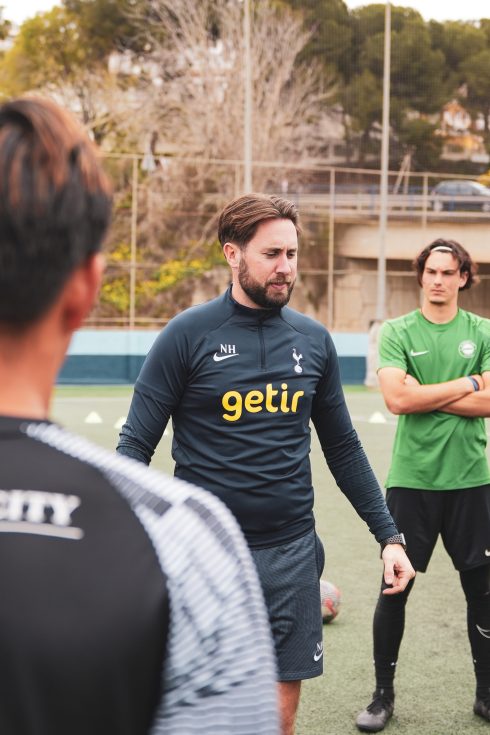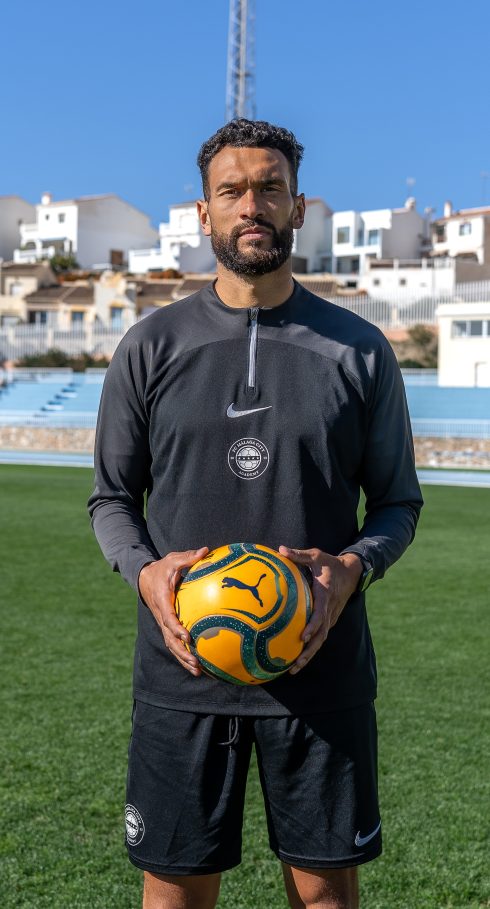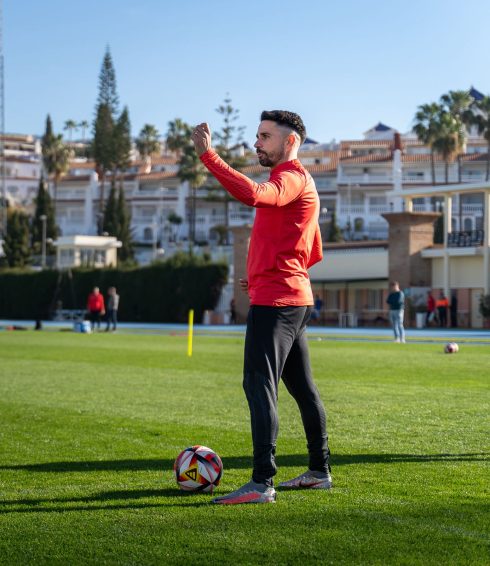SEAMLESSLY switching between fluent Spanish and English, George Jermy barks orders to his players on a sun-drenched training ground on the Costa del Sol.
Whilst the squad take a break, sipping water in the winter heat, the nimble Englishmen walks over to chat to his coaching staff, ten or more, all clad in personalised Nike training gear, discussing together what they’ve just seen out on the pitch.
We are at FC Malaga City, one of Spain’s newest and most exciting football clubs, watching on as morning training takes place.
It is an impressively professional affair for a club just seven years in age – but George Jermy, owner, founder, coach and occasional player, admits this wasn’t always the case.
“If you saw the first few years it was literally a bag of balls”, he admits.
“I was driving to games, handing in the team sheets to the referee, giving the team talk, warming up the team, then playing the game myself. It was definitely full-on and crazy”.

What started as a one-man mission to offer training to talented youngsters has expanded into a complex business consisting of a flourishing academy, a first team rocketing up the Spanish football pyramid, a women’s side competing at national level, and a beneficial affiliation with Tottenham Hotspur, the Premier League giant.
Yet this club remains firmly embedded in the values set out by Jermy, the ethos learnt and nurtured through a journeyman career punctuated by injuries.
It starts right at the beginning.
“I come from mixed heritage. My father was originally Spanish and my mum was English. I grew up in England, went to school there, did everything, and then stayed for football probably longer than I would have as it was all going OK”, he says.
At youth level, Jermy was a highly-promising winger, joining Norwich, Tottenham and AFC Bournemouth before he was lured to the Iberian peninsula.
“When I got to around 18 there was a guy called Kenny Brown, now the academy manager at West Ham United, who was out here with a team called Torrevieja. With my family ties I really wanted to come back to Spain”.
Jermy was thrown into the deep end straight away.
“One January I got signed by Villareal, I went up there on an 18 month contract with their B team and moved into a residency with kids aged between 12 and 22. It was all only in Spanish so I had to learn. If you wanted to eat or wanted to know what time training was, you had to learn very quickly. I was nervous and that brought me out of my comfort zone”.
Like millions of others who lived in Spain in 2008, Jermy’s life was turned upside down after the financial crisis – the side in Torrevieja was one casualty, going under thanks to financial woes.
It led Jermy to head down under himself, but this time to Australia after an agency contacted him.
It was there where something clicked in the 36-year old’s mind.
“I was constantly injured during the two and a half years I was out there so I had a lot of spare time and helped out with the junior section of the club. I couldn’t believe that they had literally next to nothing. It really sparked my attention”, he says.

“I was like, well, if you are a young child who lives in Melbourne, how do you become a professional football player? There wasn’t really a pathway”.
“So I brought a group of eight Australian teenagers over to Spain. They came for a month, I chaperoned them, they stayed at Nerja Club hotel, we hired out this pitch, did a little bit of technical training with them and then one of the lads signed for Velez CF’s U19s side”.
“I thought that was going to be it, I would be going back to carrying on being a lower level football player. But then they said we are going to come back and we’re going to bring some friends. 14 came for a month-long camp and really enjoyed it. Then in 2014 we had 22 players here, mostly from Australia but others from the UK and Denmark. That was the start”.
Jermy continued to ply his trade in Spain’s lower leagues – the Tercera and Segunda B – until deciding it was time for a change.
“Some of our guys would go on and sign for some teams and it worked really well and they went on to have a career. But there were problems for others, the things you get in Spain, people being told they were going to get a salary and an apartment but then having to phone me up.”

“We got tired. So I thought, you know what, we have a training academy, let’s start a football club. So for the 2017/18 season we registered as a proper football club in the bottom rank of the leagues”.
Malaga City FC was born – and Jermy was sure to impart his own unique philosophical values on how the club was going to be run.
“The philosophy and the values – we are going to be an amateur club, but we are going to try and do things in a professional manner”.
That identity has proven the catalyst for success, with the side sky-rocketing through the bottom tiers of Spain’s football structure to Tercera, the first fully national category.
Some have even labelled the club as the ‘Spanish Salford’, referring to the Manchester-based side who climbed the divisions after being acquired by the Class of 92 group, whose backers include the likes of Gary Neville and Paul Scholes.
But Jermy is quick to reject this comparison, highlighting the financial issues and worries that make it tough to remain competitive.
He says: “It’s been a challenge because now you’re playing against professional teams – probably half of the league is professional. There are guys who may earn €3,000 a month but we cannot match those wages across the squad. You get a tiny bit of funding from the Spanish FA, but we don’t have backers or investment so it’s been a test for us to find the right calibre of player that can compete at this level and fit within the financial constraints”.

One ingenious solution – to ensure that both the players receive a sufficient salary and the club can afford the wages – has been to allow players to work in the club’s office in the afternoon after training in the morning.
Jermy also hopes that the club’s link with Tottenham, harboured by connections dating back to his youth days, can give them an edge against their rivals.
“I really enjoyed the short stint that I had there and it was a club I always admired. Last year we became a global partner with them and it’s a collaboration where they send staff over to us four times a year, ours go there for CPD [Continued Professional Development], and we also take our junior teams to play exhibition games”, he explains.
Another recent positive has been the arrival of the side’s new head coach – Steven Caulker, the former Liverpool centre half and England international.
For Jermy, a chance meeting was a perfect stroke of luck: “Steven came on holiday here to Nerja and it was just one of those things where the stars align. I met him straight away and thought he was a really great character to get involved with here. It may not be a leap of faith but he has obviously never been a first-team manager before, but I am fully backing him and I hope we can help in this chapter of his development and give us a lot as a club before I’m sure he goes onto higher levels”.
He also hopes Caulker’s star profile and reputation will help to lure more players to ply their trade on the Costa del Sol.
“We had our biggest signing last summer, a boy called Dantaye Gilbert who came to the academy for 18 months. We helped him get into the Trinidad and Tobago U20 national team and he has just signed for PSV, playing for their second team in the second division. It’s immense”, he says.
“With Steven now getting involved and the profile he brings, it is really going to help, not just with players going out but also with us getting loan players in, which is what we really need with the financial model that we have”.
Caulker’s arrival will also give Jermy the much-deserved opportunity to take a step back from his all-encompassing role. He says: “My idea is to go away from coaching and playing and develop into a sporting director, to try and help out across the whole club”.
“As much as it’s really fun to compete at Tercera level, it does detract from having time to watch the U19s train, or to see our female side, so I want to leave this side of things in Steven’s very capable hands”.
READ MORE

